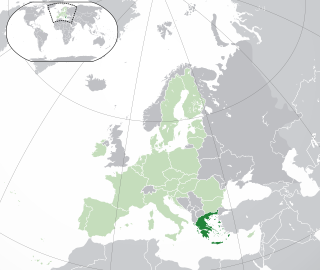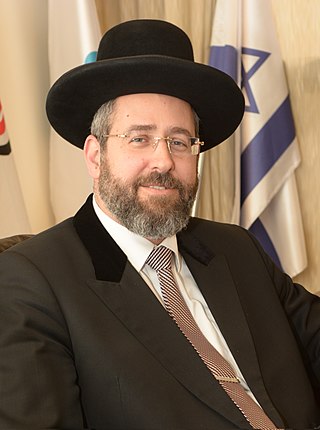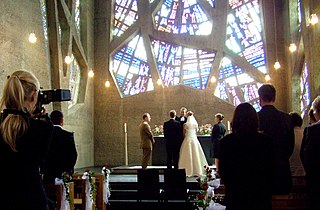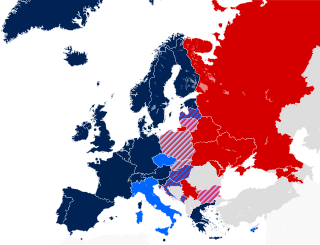Gallery
- A wedding in Ioannina, 2012
- A Greek Orthodox wedding
Marriage in Greece is allowed for both residents and non-residents of the country. Marriages may be civil or religious; civil marriages are performed by the mayor. In most cases religious ceremonies will be conducted by the Greek Orthodox church. [1] Same-sex marriage has been legal in Greece since 2024. [2]
The subject of homosexuality and Judaism dates back to the Torah. The book of Vayikra (Leviticus) is traditionally regarded as classifying sexual intercourse between males as a to'eivah that can be subject to capital punishment by the current Sanhedrin under halakha.

Marriage in Judaism is the documentation of a contract between a Jewish man and a Jewish woman in which God is involved. In Judaism, a marriage can end either because of a divorce document given by the man to his wife, or by the death of either party. Certain details, primarily as protections for the wife, were added in Talmudic times.

A wedding is a ceremony where two people are united in marriage. Wedding traditions and customs vary greatly between cultures, ethnic groups, races, religions, denominations, countries, social classes, and sexual orientations. Most wedding ceremonies involve an exchange of marriage vows by a couple, presentation of a gift, and a public proclamation of marriage by an authority figure or celebrant. Special wedding garments are often worn, and the ceremony is sometimes followed by a wedding reception. Music, poetry, prayers, or readings from religious texts or literature are also commonly incorporated into the ceremony, as well as superstitious customs.
Same-sex marriage, also known as gay marriage, is the marriage of two people of the same legal sex. As of 2024, marriage between same-sex couples is legally performed and recognized in 36 countries, with a total population of 1.3 billion people. The most recent country to legalise same-sex marriage is Greece.

A civil marriage is a marriage performed, recorded, and recognized by a government official. Such a marriage may be performed by a religious body and recognized by the state, or it may be entirely secular.
Same-sex marriage has been legal in South Africa since the Civil Union Act, 2006 came into force on 30 November 2006. The decision of the Constitutional Court in the case of Minister of Home Affairs v Fourie on 1 December 2005 extended the common-law definition of marriage to include same-sex spouses—as the Constitution of South Africa guarantees equal protection before the law to all citizens regardless of sexual orientation—and gave Parliament one year to rectify the inequality in the marriage statutes. On 14 November 2006, the National Assembly passed a law allowing same-sex couples to legally solemnise their union 229 to 41, which was subsequently approved by the National Council of Provinces on 28 November in a 36 to 11 vote, and the law came into effect two days later.
Same-sex marriage has been legal in Greece since 16 February 2024. In July 2023, the re-elected government headed by the New Democracy party announced its intention to legalize same-sex marriage. Legislation was introduced to the Hellenic Parliament on 1 February 2024 and passed on 15 February by 175 votes to 77. The bill was signed into law by President Katerina Sakellaropoulou and took effect upon publication in the Government Gazette on 16 February. Greece was the 16th member state of the European Union, the 21st country in Europe and the 36th in the world to allow same-sex couples to marry.

Steven Greenberg is an American rabbi with a rabbinic ordination from the Orthodox rabbinical seminary of Yeshiva University (RIETS). He is described as the first openly gay Orthodox-ordained Jewish rabbi, since he publicly disclosed he is gay in an article in the Israeli newspaper Maariv in 1999 and participated in a 2001 documentary film about gay men and women raised in the Orthodox Jewish world.

Lesbian, gay, bisexual, and transgender (LGBT) rights in Greece are regarded as the most advanced in Southeast Europe and among all the neighboring countries. Public opinion on homosexuality in Greece is generally regarded as culturally liberal, with civil partnerships being legally recognised since 2015 and same-sex marriage since 16 February 2024.

Marriage law is the legal requirements, an aspect of family law, that determine the validity of a marriage, and which vary considerably among countries.
This is a history of same-sex unions in cultures around the world. Various types of same-sex unions have existed, ranging from informal, unsanctioned, and temporary relationships to highly ritualized unions that have included marriage. State-recognized same-sex unions have recently become more widely accepted, with various countries recognizing same-sex marriages or other types of unions. A celebrated achievement in LGBT history occurred when Queen Beatrix signed a law making Netherlands the first country to legalize same-sex marriage.

The legal status of same-sex marriage has changed in recent years in numerous jurisdictions around the world. The current trends and consensus of political authorities and religions throughout the world are summarized in this article.

The Chief Rabbinate of Israel is recognized by law as the supreme rabbinic authority for Judaism in Israel. The Chief Rabbinate Council assists the two Chief Rabbis, who alternate in its presidency. It has legal and administrative authority to organize religious arrangements for Israel's Jews. It also responds to halakhic questions submitted by Jewish public bodies in the Diaspora. The Council sets, guides, and supervises agencies within its authority.

Catholic Christianity is the predominant religion in Malta. The Constitution of Malta establishes Catholicism as the state religion, and it is also reflected in various elements of Maltese culture.
Same-sex marriage is not legal in Israel, but the government has recognized same-sex marriages performed abroad since 2006. Prior to 2022, marriages performed in Israel were only valid when registered with one of the 15 religious marriage courts recognized by the state, none of which permit same-sex marriage. Consequently, Israeli same-sex couples who wished to have their marriages recognized by the government first had to marry outside Israel, in a jurisdiction where such marriages are legal, and then register upon returning home.

A marriage officiant or marriage celebrant is a person who officiates at a wedding ceremony.

In Israel, marriage can be performed only under the auspices of the religious community to which couples belong, and inter-faith marriages performed within the country are not legally recognized. However, marriages performed abroad or remotely from Israel must be registered by the government. Matrimonial law is based on the millet or confessional community system which had been employed in the Ottoman Empire, including what is now Israel, was not modified during the British Mandate of the region, and remains in force in the State of Israel.
Many views are held or have been expressed by religious organisation in relation to same-sex marriage. Arguments both in favor of and in opposition to same-sex marriage are often made on religious grounds and/or formulated in terms of religious doctrine. Although many of the world's religions are opposed to same-sex marriage, the number of religious denominations that are conducting same-sex marriages have been increasing since 2010. Religious views on same-sex marriage are closely related to religious views on homosexuality.

Debate has occurred throughout Europe over proposals to legalise same-sex marriage as well as same-sex civil unions. Currently 33 of the 50 countries and the 8 dependent territories in Europe recognise some type of same-sex union, among them most members of the European Union (24/27). Nearly 43% of the European population lives in jurisdictions where same-sex marriage is legal.
Same-sex marriage in Judaism has been a subject of debate within Jewish denominations. The traditional view among Jews is to regard same-sex relationships as categorically forbidden by the Torah. This remains the current view of Orthodox Judaism.